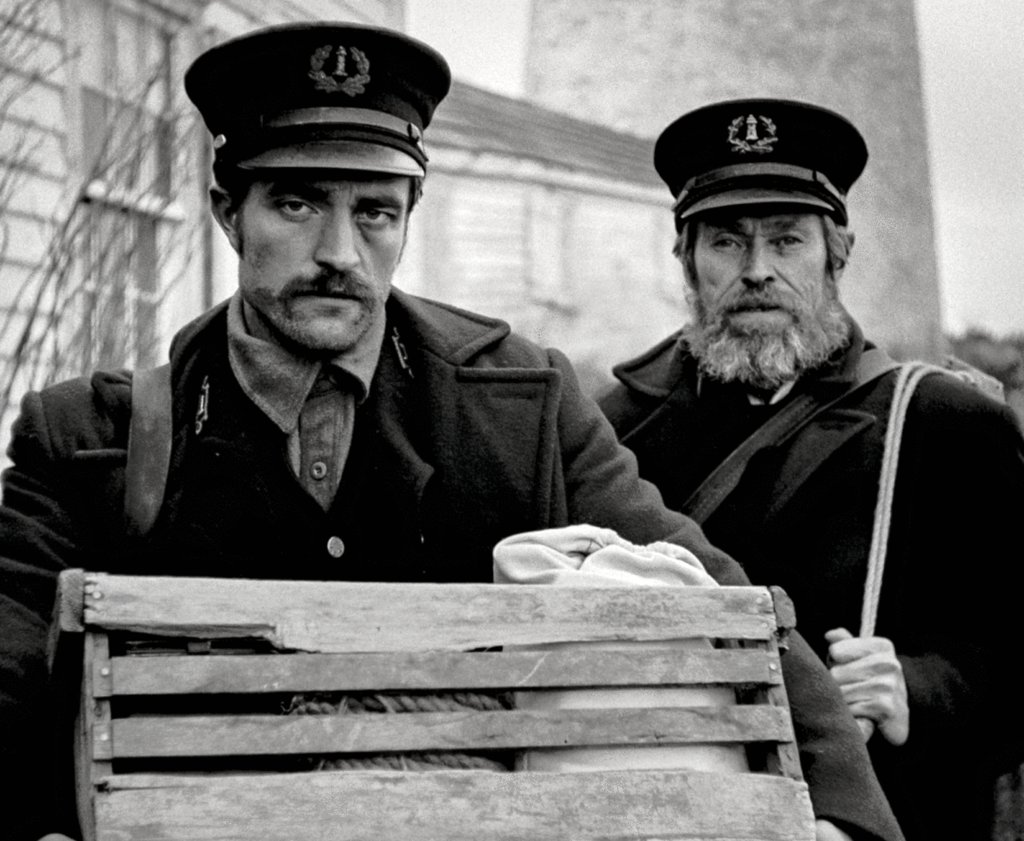by Chris Feil

As gloopy with various bodily fluids as it is with sea foam, Robert Eggers’ The Lighthouse lulls us into insanity from its first foggy frame. Diverging from the more straightforward horrors of his debut The Witch, Eggers thrusts us into the isolate hellscape that is the male mind with this Mellville-esque absurdist dark comedy. The bizarre quotient is high, both in the film’s psychosexual hysterics and crusty verbal dexterity, as the film devolves into an abstract battle of the wits and wills of two men meant to preserve the titular phallic monument. It’s genius and a complete hoot.
Set over a century ago on an offshore island, this tempestuous and physically taxing setting plays host to the two male egos of Robert Pattinson and Willem Dafoe’s lighthouse watchmen. Dafoe’s superstitious, more experienced Thomas immediately puts Pattinson’s Ephraim to back-breaking arduous work, dominating him further over candlelit dinnertime monologues...
And how couldn’t you go a little mad? Ephraim is beleaguered by the elements, the tongue lashings of his elder, and a real jerk of a seagull. Meanwhile, time quickly drones into a blur with Thomas’ farts blaring in chorus with the lighthouse’s siren horn. Once their depleted stock of booze turns them to making gasoline cocktails for their hooch, the film becomes an unhinged series of possibly imagined showdowns between the men.
Cinematographer Jarin Blaschke depicts the lighthouse-keeping life with Béla Tarr inspired black and white grimness, framing it in a maddeningly confined 1.19 aspect ratio of early silent cinema. Co-written with his brother Max, Eggers mounts a narrative that grows ecstatic in depicting their mental breakdown both in structure and in their verbal warfare. What will safely become one of the most quotable films in recent memory (zingers include “curdled foreskin” and “sperm whale’s pecker”), The Lighthouse leans into its seafaring patter with giddy madness, serving to underline the innate silliness of such aggressively serious men. However despite the frenzy that the film works itself into, Eggers’ creative force feels as composed and exacting - safely one of the most impressively designed films of the year, no matter how cuckoo.

Wilder yet is the film’s court jester approach to male sexual anxiety and its ability to further send Ephraim into a dissociative pit. On arrival, he is immediately fixated on a mermaid figurine he first finds buried in a tear on his mattress, fantasizing (or hallucinating) a sea siren in the flesh. The confined quarters and their lowered defenses naturally turns homoerotic, adding another layer to their drunken bickering and ultimately codependent rage. Their psychological breakdown is as much due to the environment as it is their stifled hormones, and Eggers takes a particular glee in masculine sexual hangups.
But the film’s two-hander wonder also largely belongs to exquisitely matched Pattinson and Dafoe. The elder screen legend might have reached the peak of his recent resurgence here, spouting reams of nonsensical dogma to belittle Ephraim with bug-eyed mania. This kind of craggy, Ahab-on-hallucinogens portrayal is a Dafoe delicacy, the kind of wild full immersion that he does best - and it’s certainly one of his best. Pattinson however delivers a rigorously funny and physical performance as the submissive of the two who just can’t submit no more, asserting Thomas’ dominance with an almost dim-bulb lack of self-awareness. Together, it’s a duet of delicious artifice and audacity, as fully realized in believable detail as Eggers construction around them. A-